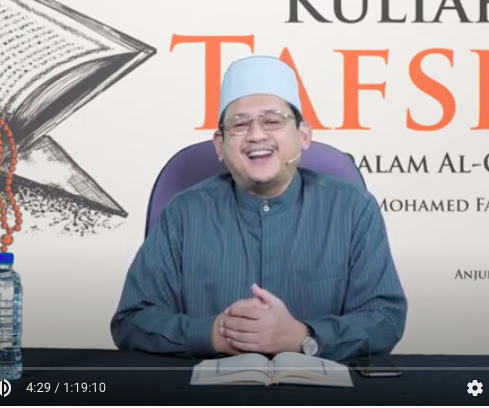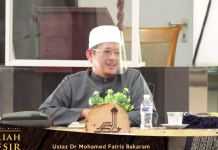بسم الله الرحمن الرحيم
Bismi-llāhi r-raḥmāni r-raḥīm
In the name of Allah, Most Gracious, Most Merciful
اللهم صلي على سيدنا محمد وعلى اله وصحبه وسلم
Allahumma salli ala Sayyidina Muhammad wa ala alihi wa sahbihi wasallim
O Allah, send your peace and blessings upon our Master Muhammad and upon his family and companions
This article is a summary of takeaways from Ustaz Dr Mohamed Fatris Bakaram’s Tafsir Online Lecture on 4th October 2020. Summaries of previous lectures on Surah Maryam, Surah Taha, Surah Al-Anbiya’ and Surah Al-Hajj can be found here. The previous lecture of Surah Al-Mu’minun can be found here.
Clarification on Last Week’s Topic: Zina and Children born out of Zina
Correction on ‘Preservation of Progeny’
In the previous lecture, I spoke about the Daruriyyat Al-Khams (the Five Fundamental Needs). I mentioned that every ruling in Islam must preserve all these five principles: Religion, Life, Reason, Property, and Progeny.
I spoke about the ‘Preservation of Progeny’ saying that in Arabic, we refer to the ‘Preservation of Progeny’ as حِفْظُ النَّسَب (Hifz An-Nasab), حِفْظُ النَّسَل (Hifz An-Nasl) or, very rarely, it is referred to as حِفْظُ العَرَض (Hifz Al-‘Aradh).
I would like to make a correction. The proper term should have been حِفْظُ العِرَض (Hifz Al-‘Irdh). ‘Al-‘Aradh’ would have referred to ‘items, possessions or property’. The term Al-‘Irdh refers to ‘dignity’.
Children born out of Rape
Q: What is the ruling of a child born out of rape? Is the status of the child similar to a child born out of Zina?
A: The technical ruling, as per discussed by scholars, is that since the act that caused the child’s conception was not under a valid Nikah, then the child is not legally linked to his biological father. The man who has committed the crime has no rights over the child.
As the mother of the child bears the child from her own womb, she is both the child’s biological and legal mother. The status of a child conceived out of rape is the same as that of a child conceived out of Zina.
The child is honoured; there is neither sin nor blame on him for what his act may have been committed for his conception. The child is not to be hurt, mocked, abandoned, or neglected.
In recent years, another topic of discussion has emerged regarding this issue. The question has been raised on the permissibility of terminating a pregnancy caused by rape through abortion. The conception of the child was not due to the mother’s own choice and actions, rather, it is a result of a sexual violation upon her.
This is different from a child of Zina, who is conceived out of the biological parents’ mutual decision to commit the act that caused the pregnancy. In the situation of Zina, a pregnancy should not be terminated, and the baby should be preserved and taken care of during and throughout pregnancy.
There are two opinions on this matter. The first states that similar to a child born out of Zina, when an embryo is formed out of the fertilisation of an egg, and a woman becomes pregnant, abortion is not an option. It is haram to kill the baby who did no wrong and who has the right to live.
The second opinion states that the permissibility of abortion depends on the readiness of the mother to care for the child. If it is predicted that the baby’s birth will bring about harm to the mother, the family, or the child, then abortion is permissible under one condition – the child’s spirit cannot have already been blown into the foetus. What does this mean? It means that for as long as the pregnancy has not surpassed 120 days, the abortion is still permissible.
Based upon hadith, a person’s spirit is blown into their body after 120 days. As such, if the mother of the child is found to not be ready to welcome the baby – if the baby’s arrival will negatively impact the mother emotionally and psychologically – then certain scholars say that an abortion within the first 120 days is permissible.
The birth of the child might cause the mother to go into depression because she is unable to deal with or accept the arrival of the new-born, because the child is born out of a violation upon her.
After 120 days, the foetus would already have a life. The foetus would have become an Insan, a living human being – a child that has a right to live. If the mother is unable to accept the child, and her family is unable to accept him, then it becomes the responsibility of the community to ensure that the child is born safely, protected, and nurtured in a good manner.
Paternity Testing
Q: In today’s world, with the advent of DNA testing, we are able to confidently determine who the child’s father is. As such, shouldn’t we be able to use that to determine and declare who the child’s father is?
A: There are two aspects to determining who a child’s father is. The first aspect is biological. The second is based upon Islamic law. DNA testing in the modern world can be used to determine the biological father of a child.
However, whatever we have discussed last week comes under the discussion of the child’s legal father according to Islamic law. The religion defines the child’s father not just based upon biology.
Even if DNA evidence supports a man’s claim that the child that a woman is bearing is his, a child conceived out of Zina cannot be legally assigned to the man in Islam.
In Islam, anything that is produced out of actions that are not valid in Allah’s religion are themselves considered invalid. For example, we say that the fertilisation of gametes occurred out of an invalid relationship, one in which nikah had not taken place prior to sexual intercourse.
As the sexual intercourse was haram, and the relationship was not valid according to Allah SWT’s laws, then whatever is produced as a result of the invalid act is also deemed invalid according to Allah’s laws.
If I purchase this bottle of water using my own wealth, then this bottle becomes my property. The purchase of the bottle is an outcome of a valid act. If I receive it as a gift from someone, it also becomes rightfully mine; it is the result of a valid act of giving.
In both situations, the water in the bottle is Halal for my consumption. However, if this bottle belonged to someone else, and I took it without the owner’s permission or knowledge, knowing that the owner would have protested my taking it, then taking it would be considered stealing – and stealing is an act that is Haram and not accepted in Allah’s Law. Therefore, the bottle is not validly mine, the water in it becomes Haram for me to drink.
The principle that scholars use regarding this issue is “التَّابِعْ تَبِعْ” meaning ‘what follows follows’. An invalid act leads to invalid outcomes. So even if there is DNA evidence to confirm a man’s biological relationship to a child, his legal standing as a father of the child is still invalid in Allah’s eyes for as long as the child was conceived out of nikah. There are however certain exceptional circumstances, all of which you can read up about from the previous lecture.
I would like to emphasise that at the end of the day, according to the current official fatwa in Singapore, for as long as the child is a product of pre-marital sexual intercourse (i.e. Zina), then the child cannot be accepted as a legitimate child of the biological father.
I also assert that if there are new circumstances, situations, and cases to consider or if there are new needs in the community, then it is possible for the fatwa committee to change their decision and we will then follow whatever the new rulings are.
Inheritance for a child of Zina
Q: If the paternal relationship is invalid, can a child inherit from his biological father?
A: As of now, the fatwa says that this is not allowed. If the child is clearly a child of Zina, then regardless of whether or not his biological parents do perform nikah with one another, or whether the child is born within 6 months or after 6 months after the nikah, or whether the biological father claims to be the child’s father, the current fatwa states that the child cannot inherit from the biological father.
We do understand that in the community there are sometimes extraordinarily complex situations. If an illegitimate child does not inherit from her father, but his younger siblings do, then it causes many complications in the family. So now let us have a deeper look into this. We have a case study to demonstrate this.
Let us say that a Mr Lanang has Zina with Miss Kuning, and a child (first child) is conceived out of Zina. The year after, Mr Lanang has Zina with Miss Coklat, and another child (second child) is conceived out of Zina. Mr Lanang marries Miss Coklat and after 6 months following the Nikah, the child is born.
Several years later, Ms. Coklat becomes pregnant and delivers a child. Years later, Mr Lanang has Zina once more, this time with Miss Kelabu, and another child is conceived. Mr Lanang marries Miss Kelabu, however he does so a bit late, and the child is born within less than 6 months following his second Nikah.
Now in this case study, if Mr Lanang were to die, will any of his children inherit from him? He has four biological children, but only one of his children is legitimate in the eyes of Islam. His third child was born after Nikah with Ms. Coklat, he inherits from his father.
Mr Lanang’s first child (with Ms. Kuning) will definitely not inherit from Mr Lanang, not only was he born out of Zina, his mother also did not marry Mr Lanang. Even if DNA testing were to prove otherwise, the child will not be considered legitimately Mr Lanang’s progeny.
Now when it comes to his fourth child, there is a minute minority of scholars who hold the opinion that even though the child was born less than 6 months after nikah, he is still a legitimate child because his biological parents did perform nikah.
Similarly, for the case of the second child, majority of scholars hold the opinion is that the child is not legitimate, but a few say that he can be.
If we were to follow the present fatwa just as it is, things could be simple. One child gets inheritance and the other three do not. However, if you have a look, the children will get upset finding out that one of their half-siblings is inheriting from the father, while they themselves cannot.
This is not just a question of fairness or of whether they are happy with the decision. Other factors should be considered too, the children’s welfare, their emotional states, their relationship with their parents, their view of themselves etc.
So what happens is that in cases like these, is that we leave it to the Fatwa council to study each situation on a case by case basis and to determine what is the best move forward, based on each child’s needs and welfare in consideration.
I would like to say that I am in no position to tell you which child inherits, and which does not. Only the fatwa council, the body of the most esteemed and trusted scholars, can determine and declare who inherits from Mr Lanang.
Besides inheritance, there are also other implications to consider; there is the naming of the child after his father’s name, or the female child’s father becoming her Wali on her Nikah day, or the child’s monthly provision (child support in terms of providing food, shelter and clothing).
Conclusion of topic
I will not go deeper into this topic. Feel free to refer your questions to other asatizah. As a parting word on this matter, I would like to remind all of us that we should not, under any circumstance mock, criticise or taunt a child of Zina for the sins of his parents. There is no blame upon the child.
Let us be a community that cares. Strive to become someone for the community that helps to reduce the cases of Zina in the community. Let us be a community that finds solutions, not creates problems. Ameen.
What has passed has passed, whatever sins have been committed are not for us to criticise. We may not have done the sin of Zina. However, be careful that your mockery of others does not become your sin in Allah’s eyes.
You do not know, the person you mock because of their sin of Zina may someday enter Paradise because Allah SWT has accepted their Taubah and they have raised their child to become a righteous servant of Allah.
We do not want to find ourselves facing Allah SWT only to find out that because we did not hold our tongue, our tongue committed sins that stained our hearts and distanced us from Allah SWT’s Paradise. Na’uzhubillah.
Continuation of Surah Al-Mu’minun (Verses 23-25)
The Story of Prophet Nuh AS
I was looking through our past sessions to find when else we had previously discussed about Prophet Nuh AS. In other Surahs, Prophet Nuh AS was mostly just briefly mentioned without going deeper into his story. The last time we went through his story was in Surah Hud, starting from 22nd October 2017.
Even if this Prophet’s story may sound familiar to you, I would like for you to consider that our lectures have two main purposes: (1) to seek knowledge that is beneficial, (3) to give us reminders as we as human beings tend to forget. So even if the story is familiar, come with an open mind to be reminded and to learn.
وَلَقَدْ أَرْسَلْنَا نُوحًا إِلَىٰ قَوْمِهِ فَقَالَ يَا قَوْمِ اعْبُدُوا اللَّهَ مَا لَكُم مِّنْ إِلَٰهٍ غَيْرُهُ ۖ أَفَلَا تَتَّقُونَ
And We had certainly sent Noah to his people, and he said, “O my people, worship Allah; you have no god other than Him; then will you not have Taqwa?” [23:23]
Prophet Nuh AS was sent to his people with the same message as that which was sent to previous prophets before him. That is why in Surah Al-Baqarah, Allah SWT says:
لَا نُفَرِّقُ بَيۡنَ أَحَدٖ مِّن رُّسُلِهِۦۚ
‘We (Allah SWT) makes no distinction between any of His messengers’ [2:285]
This does not mean that the prophets of Allah all had the same status. No, there were five who were honoured above the rest for their patience in facing challenges, these were called the ‘Ulul ‘Azmi’.
Amongst them, the most noble is Prophet Muhammad SAW. The prophets were all honoured and distinguished by Allah SWT. However, they each had different ranks and statuses in Allah’s eyes.
What this verse refers to is that Allah SWT sent the same message to each prophet so that they may relay it to their people – the message is simple, there is no God but Allah SWT, worship Him SWT and strive to get Paradise as a reward and be protected from the Hellfire in the Hereafter.
فَقَالَ الْمَلَأُ الَّذِينَ كَفَرُوا مِن قَوْمِهِ مَا هَٰذَا إِلَّا بَشَرٌ مِّثْلُكُمْ يُرِيدُ أَن يَتَفَضَّلَ عَلَيْكُمْ وَلَوْ شَاءَ اللَّهُ لَأَنزَلَ مَلَائِكَةً مَّا سَمِعْنَا بِهَٰذَا فِي آبَائِنَا الْأَوَّلِينَ
But the Al-Mala’ of those who disbelieved among his people said: “He is no more than a human being like you, he seeks to make himself superior to you. Had Allah willed, He surely could have sent down angels; never did we hear such a thing among our fathers of old. [23:24]
Who were the Al-Mala’? They are those whom we consider as VIPs and upper-class members, people who have status and hold leadership positions in the community. They have an advantage of wealth and influence which gave them a sense of pride over others.
They were amongst the disbelievers, refusing to accept the message. These people of status put Prophet Nuh down, claiming that he AS was a nobody whose only aim was to overthrow their power and popularity.
They claimed that if Allah SWT had wanted to send them a message, He SWT would have sent down angels to bring revelation, not just some commoner from the city.
The Gift of the Mind
إِنْ هُوَ إِلَّا رَجُلٌ بِهِ جِنَّةٌ فَتَرَبَّصُوا بِهِ حَتَّىٰ حِينٍ
He is simply insane, so let us wait for a while and see.” [23:25]
This is what we see the people of Prophet Nuh AS say against him. Human beings are gifted with a mind by Allah SWT. This mind gives us the ability to think, process information, and reflect and to make decisions.
If they seek to find the truth, their mind will be useful in distinguishing right from wrong. The mind will become a tool to fulfil what the heart wants. This is a gift that Allah SWT has given to us.
However, if the heart is filled with darkness, if the heart refuses to accept goodness, then the mind will not benefit it at all. The mind will be used to generate excuses to reject the truth. The mind comes up with false accusations and reasons to distance themselves from the truth.
The people of Nuh found it difficult to believe Nuh because they used their minds to convince them that they were superior to him, that his message was nonsense because it contradicted their ancestors’ religion.
They could not speak objectively to Prophet Nus AS. When questioned about how their lifeless idols had any power to benefit them, they had no logical response.
However, they still wanted to reject the truth, so instead of speaking about the logical arguments being put forth, they attacked the person bringing the arguments. They accused, criticised, and mocked him.
Regardless of who was going to bring the message to them, it would not have made a difference to them, because they did not want to listen to the truth.
Take care of the Message not the Messenger
In Islam, we are taught to pay attention to the message rather than the messenger. For example, at the start of this lecture, I corrected myself regarding a mistake in my word choice for last week’s lecture.
I admit it was a slip that I made, I had not checked previously to ensure I got the correct word. The person who pointed out that error was in fact one of my ex-students. I used to teach her and now she is also a teacher herself.
There is no issue in that, the truth can come from anyone regardless of who they are. When a reminder comes to you, look at the content rather than who the person delivering it may be.
The truth may come from your student, your mother, or even your child. It could be someone who has a lower status from you. If you are given a reminder, accept it, think about it, and reflect upon it.
We are never taught in the religion to reject a piece of advice just because it comes from someone we deem inferior to us. In Islam, we are taught about Naseehah (Advice) from this hadith:
قَالَ: الدِّينُ النَّصِيحَةُ
قُلْنَا: لِمَنْ؟
قَالَ: لِلَّهِ، وَلِكِتَابِهِ، وَلِرَسُولِهِ، وَلِأَئِمَّةِ الْمُسْلِمِينَ وَعَامَّتِهِمْ
The Prophet SAW said, “The Deen (religion) is Naseehah (advice, sincerity).” We said, “To whom?” He SAW said, “To Allah, His Book, His Messenger, and to the leaders of the Muslims and their common folk.”
Advice to Allah means to hold onto Allah SWT’s Deen firmly. Advice to the Prophet SAW means to hold onto his Sunnah well. And as for advice to the leaders and their common folk, it is the same advice regardless of who they are or what their status is.
Remember this: “Look at what is spoken, rather than who is speaking.” Do not become like the people of Prophet Nuh AS who rejected the message because they could not look past the messenger.
Learning the Deen from Teachers
Q: Does this mean that in learning the religion we should not filter our teachers to make sure that we only learn from those who are qualified to teach?
We often hear our teachers tell us to be careful from whom we take knowledge. Yet you tell us to look at the message not the messenger. How do we resolve this seeming contradiction?
In learning the religion, we also need to look at who the teacher is. Rasulullah SAW reminds us in Surah An-Nahl:
فَسَۡٔلُوٓاْ أَهۡلَ ٱلذِّكۡرِ إِن كُنتُمۡ لَا تَعۡلَمُونَ
So, ask the people of knowledge if you do not know. [16:43]
If you know of someone who does not even perform his five daily Salah, do not expect to learn religion from him. If you find someone who is foul-mouthed, who does not complete his fasts in Ramadhan, even if he that says he is a teacher of the Deen, do not be quick to accept him.
However, if we do see someone who on the surface can be trusted, because of his Akhlak, his ‘Ilm and his religious education, only then can we start “looking at the message not the messenger”.
When you are looking at a panel of trustworthy teachers, then do not pick and choose them based on any criteria. Listen and learn from the message that they deliver, rather than who they are. Make your decisions based on what the content they deliver may be, not their physical appearance, their age, their experience or their status.
This is different from the story of Prophet Nuh’s people. Prophet Nuh’s people did not reject him based on his character flaws. They rejected him for his lack of wealth, status, influence, and lineage.
Likewise, for us, if a younger sibling or a child or a subordinate gives you a piece of advice, do not be quick to reject them and bring up your higher position. Do not say, “Do you know who I am? Who do you think you are to want to advise me?”. Be open to learning and humble yourself in order to receive the truth from Allah SWT. Let me end with a brief story.
The Story of Muhammad Ibn Sirrin
Ibn Sirrin, also known as Abu Bakar, was once sitting with his students when two men appeared. They said, “Ya Sheikh Abu Bakar! We want to present some hadith of the Prophet SAW to you”.
Ibn Sirrin responded, “I do not permit it. I don’t want to hear it.”. He did not let them speak. They said, “We want to recite some Qur’an to you.”. Ibn Sirrin responded, “Don’t do it. I do not permit it.”. He refused to listen to them. He then instructed them to leave, otherwise he would leave himself.
The two men got up and left. Ibn Sirrin’s students then asked him what the matter was and why he would not accept their requests. Ibn Sirrin responded saying, “I did so because I was worried.
I do not know who they are or what their background is. If they had recited the Qur’an with edits made to it, I fear that that is what you, as listeners, get may remember, because they recite it in my presence.”
At times, things enter our subconscious memory without us realising it. Ibn Sirrin wanted to ensure that his students got only knowledge that was true and right. He did not trust these strange men for he did know much about them. So he took responsibility in not accepting the two imams’ “knowledge” for his students.
That is it for this lesson. Thank you for your attention and I will see you again next week at the same time and place insyaa Allah. I love you all for the sake of Allah SWT.
——————–
Summary by: Arina Adom
Arina Adom is a lover of learning who takes on the world with an open mind. Resourceful and adaptable, always ready to take on new challenges. Comfortable working with diverse groups of people, yet able to work independently. Thrives under pressure. Currently seeking a meaningful career that enables her to impact lives directly and bring about positive changes in the lives of others in the community.
Arina graduated with a degree in Science ( Hons ), Life Science from NUS. She is currently taking a diploma in Quran and Sunnah Studies from Al Zuhri.
Watch Kuliah Tafsir again at
Masjid Darul Makmur’s Youtube
Watch and follow Kuliah Tafsir weekly
every Sunday after solat Maghrib

organised by Masjid Darul Makmur
Your contributions are appreciated. Get more details by clicking the image below.











